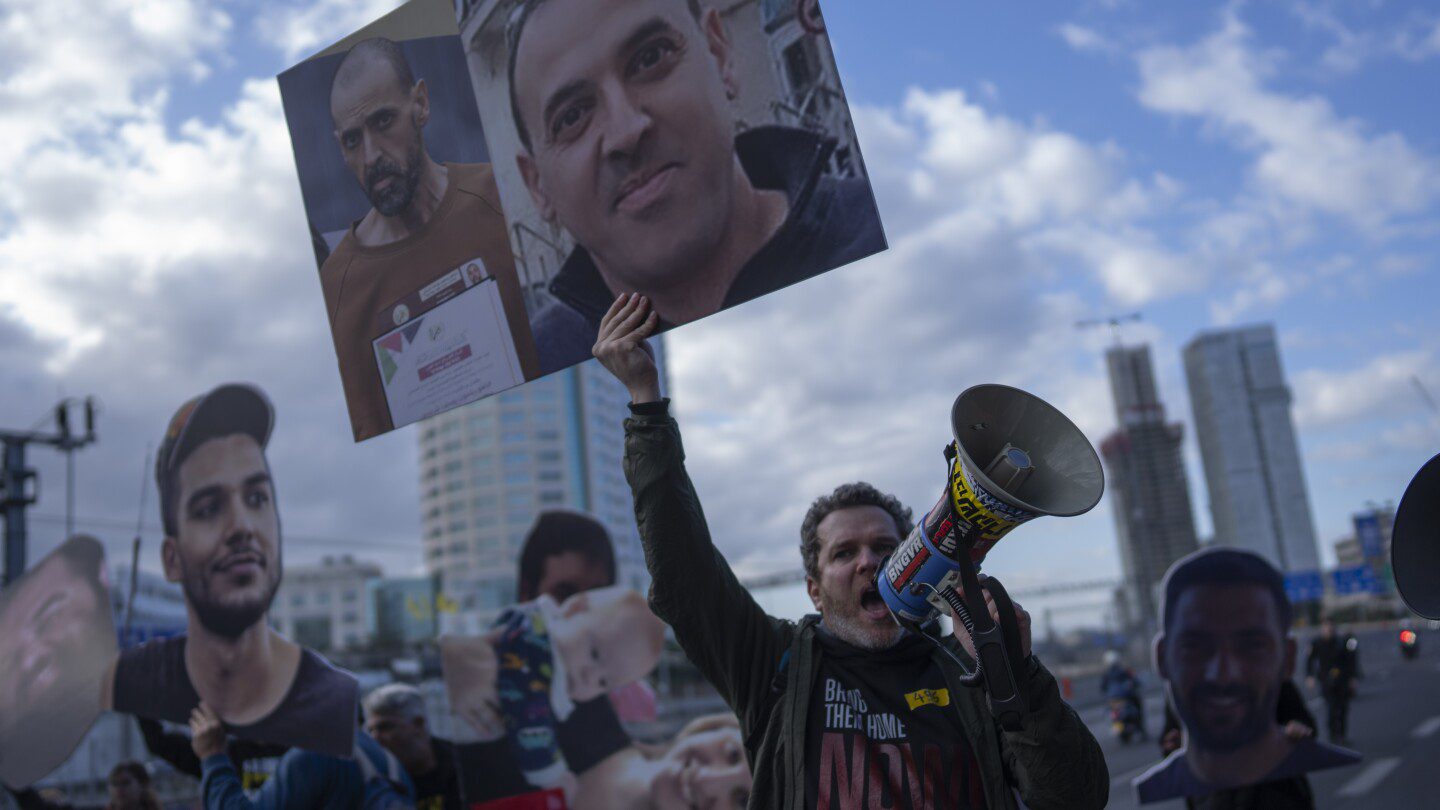
CAIRO (AP) — Hamas announced on Thursday its intention to release three additional Israeli hostages, thus moving towards addressing a significant contention regarding the ceasefire in the Gaza Strip.
The militant group had previously indicated it might delay the release of captives, citing Israel’s noncompliance with its commitments to facilitate the entry of tents and shelters, among other perceived breaches of the ceasefire agreement. Israel, backed by U.S. President Donald Trump, has stated it will resume hostilities against Hamas if the hostages are not released.
The Hamas declaration is expected to maintain the ceasefire for the time being, despite Israel’s report on Thursday of a rocket being fired from Gaza—though concerns linger regarding the sustainability of the truce.
According to Hamas, discussions took place in Cairo with Egyptian officials, and contacts were made with Qatar’s prime minister regarding the delivery of more shelters, medical supplies, fuel, and heavy machinery to clear debris—key demands in recent negotiations. The group stated that mediators had committed to “eliminate all obstacles.”
Following the announcement, Hamas spokesperson Abdul Latif al-Qanou confirmed by phone to The Associated Press that three hostages are scheduled for release on Saturday.
Egypt’s state-owned Qahera TV, closely linked to the nation’s security services, reported that Egypt and Qatar had effectively resolved the disagreement. Both Arab nations have acted as crucial mediators with Hamas, helping to establish the ceasefire that took effect in January, over 15 months into the armed conflict.
Media in Egypt also broadcast footage of trucks transporting temporary housing and bulldozers at the Rafah crossing on the Egyptian side, indicating that these items were on their way to an Israeli inspection area before entering Gaza.
With the ceasefire currently holding, the Israeli military reported a rocket was launched from Gaza on Thursday, marking what seems to be the first incident of this kind since the agreement began. The rocket landed within Gaza, and the military later stated that it targeted the launcher responsible for the incident.
Since the ceasefire commenced, Israeli fire has reportedly killed at least 92 Palestinians and injured over 800, according to Munir al-Bursh, the director general of the Gaza Health Ministry. The Israeli military contends it has responded to individuals approaching its forces or entering specific areas in violation of the ceasefire.
Uncertainty Surrounding the Truce
The ceasefire is anticipated to face greater challenges in the upcoming weeks. The initial phase is scheduled to conclude at the beginning of March, and meaningful negotiations regarding the second phase, which would involve Hamas releasing dozens of remaining hostages in exchange for an end to the conflict, have yet to commence.
Trump’s proposal to relocate approximately 2 million Palestinians from Gaza to other countries has further clouded the future of the truce, which has generated significant doubt. This plan has received backing from the Israeli government but has faced staunch opposition from Palestinians and Arab nations, which have rejected any potential influx of refugees. Human rights organizations have voiced concerns that this could amount to a war crime under international law.
The proposal has drawn new criticism from both allies and adversaries of the U.S. In an unusual criticism, Turkey’s President Recep Tayyip Erdogan remarked that Trump’s recent actions—specifically his push to remove Palestinians from Gaza—represent a threat to global peace.
“To be truthful, I do not consider Mr. Trump’s actions throughout this period and his current statements as positive developments for many nations,” Erdogan articulated during an interview with an Indonesian television host.
Yemen’s Houthi leader Abdul-Malik Al-Houthi cautioned against a possible “military intervention” should the plan advance.
“We will not stand by in the face of such an aggression against the Palestinian people,” Al-Houthi declared in a televised address.
Israeli Prime Minister Benjamin Netanyahu’s far-right allies are already calling for a resumption of hostilities after the initial phase, with the intent of executing Trump’s plan and dismantling Hamas, which continues to govern the territory following one of the most devastating military campaigns in recent memory.
The conflict ignited on October 7, 2023, when militants led by Hamas infiltrated Israel, resulting in approximately 1,200 deaths, primarily among civilians, and the abduction of 251 individuals. More than half of these hostages have been released through various deals with Hamas or other arrangements, while eight have been rescued, and numerous bodies have been recovered.
The captives represent one of the few negotiating tools that Hamas retains, and the group may find it difficult to agree to further releases if it suspects that the conflict will reignite.
Trump’s statements regarding his goals for Gaza have been ambiguous.
He has claimed credit for facilitating the ceasefire that was negotiated shortly before he took office after prolonged discussions during the Biden administration. However, he has also expressed skepticism about the agreement’s progression and has stated that it is up to Israel to decide whether to resume the conflict, while assuring ongoing U.S. military backing.
Seventy-three hostages are still awaiting release, around half of whom are feared dead. The majority of the remaining captives are men, including Israeli soldiers.
The conflict has resulted in the deaths of over 48,000 Palestinians, predominantly women and children, according to Gaza’s Health Ministry, which does not provide information on how many were combatants. Israel claims it has killed over 17,000 militants without disclosing evidence.
Israel’s offensive has devastated significant portions of Gaza. At the peak of the violence, approximately 90% of the territory’s 2.3 million residents were displaced. Although hundreds of thousands have returned since the ceasefire was enacted, many have found their homes in ruins, littered with human remains and unexploded ordnance.
___
Lidman reported from Jerusalem. Associated Press correspondents Fatma Khaled in Cairo and Julia Frankel in Jerusalem contributed.
___
Stay updated with AP’s coverage of the war at https://apnews.com/hub/israel-hamas-war









